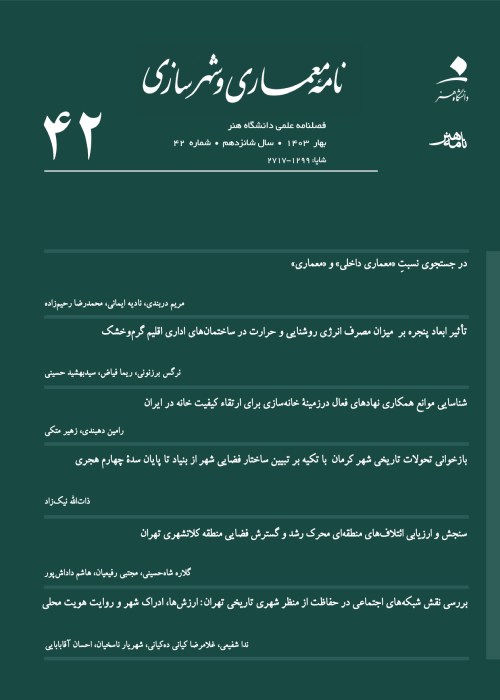Participatory Planning Environment: A Conceptual Model for Analysis of Effective Factors in Citizen Participation in Planning
Author(s):
Abstract:
Positive consequences of citizen participation in planning process are irrefutable. Over the last few years, most countries have been considering citizen participation in planning, as they attempt to provide the grounds for public participation at different levels of planning and decision-making. While the concept of public participation has been developed in a piecemeal fashion in developed countries and while it is in line with their social, economic, political and cultural structure, its application to developing countries with numerous planning-related problems (e.g. poverty, rapid urban development, inefficiencies in service provision, infrastructure and institutional frailty, etc.) without due consideration to the characteristics of their planning environments, may not lead to much significant success. Achieving public participation in these hostile contexts requires either a reform in existing procedures and structures (i.e. a long-term strategy) or maximization in application of citizen participation capacities in existing planning procedures and structures with an emphasis on the role of planners as the key players. This research aims to introduce a conceptual model for analyzing the effective factors of participatory planning in the planning environment. In this regard this work is an attempt to study the models and theories related to planning environment, decision environment, planning system, and planning culture in general. It further offers a primary and temporary framework for effective participatory planning factors by surveying two kinds of research: (1) research that directly or indirectly mentions the effective factors on success or failure of public participation, and (2) research that introduces some criteria for evaluating participatory planning (from process- or result- viewpoint or both). In order to identify the effective factors in participation realization, and to better unite practice and theory in this matter, the proposed framework of basic factors seeks to incorporate normative and instrumental benefits of participation to provide a pragmatic, moderate, and genuine understanding of citizen participation in the form of contextual variables and potential impacts. Finally, to reconsider the primary conceptual framework and offer a conceptual model of participatory planning, the effective factors on the realization of public participation have been examined in the planning environment model. Based on the nature of participation and the influences it attains from informal structures, the submitted conceptual framework emphasizes both formal and informal structures of planning environment at six analytical levels: external planning environment consists of two analytical levels of: (1) government (e.g. political sustainability and stability of politics, commitment to public participation processes, economic structure, etc.), and (2) participants (e.g. motivation, skills, knowledge and experiment, social capital, etc.). Internal planning environment consists of three analytical levels of: (3) planners and planning institutions (such as professional ethics and commitments, norms and cognitive frameworks, accountability, etc.), (4) legislations (e.g. incentives and deterrent policies, rules and regulations in the field of public participation, etc.), and (5) mechanism and procedures (such as representativeness, accountability, providing sufficient information, timing, etc.). The sixth level implies (6) external changes, like globalization, the impact of technological changes in information and communication. This conceptual framework can lead to identification of the limitations in Irans planning environment in the field of citizen participation. The components of the model can further be reviewed according to Irans planning environment specifications.
Keywords:
Language:
Persian
Published:
Journal of Architecture and Urban Planning, Volume:9 Issue: 18, 2017
Pages:
23 to 42
https://magiran.com/p1715272
دانلود و مطالعه متن این مقاله با یکی از روشهای زیر امکان پذیر است:
اشتراک شخصی
با عضویت و پرداخت آنلاین حق اشتراک یکساله به مبلغ 1,390,000ريال میتوانید 70 عنوان مطلب دانلود کنید!
اشتراک سازمانی
به کتابخانه دانشگاه یا محل کار خود پیشنهاد کنید تا اشتراک سازمانی این پایگاه را برای دسترسی نامحدود همه کاربران به متن مطالب تهیه نمایند!
توجه!
- حق عضویت دریافتی صرف حمایت از نشریات عضو و نگهداری، تکمیل و توسعه مگیران میشود.
- پرداخت حق اشتراک و دانلود مقالات اجازه بازنشر آن در سایر رسانههای چاپی و دیجیتال را به کاربر نمیدهد.
In order to view content subscription is required
Personal subscription
Subscribe magiran.com for 70 € euros via PayPal and download 70 articles during a year.
Organization subscription
Please contact us to subscribe your university or library for unlimited access!


